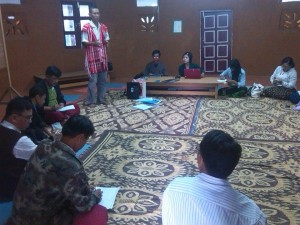In order to increase the involvement of Burma’s ethnic communities in the country’s peace process, several ethnic community organizations joined together to found the Ethnic Nationalities for Peace (ENFP) on 19th November.
 According to U Minn Minn Nwe, a Mon representative of the ENFP, the organization is comprised of representatives from ethnic community organizations throughout Burma. The goal of the organization is to provide effective assistance to further ethnic participation in the peace process.
According to U Minn Minn Nwe, a Mon representative of the ENFP, the organization is comprised of representatives from ethnic community organizations throughout Burma. The goal of the organization is to provide effective assistance to further ethnic participation in the peace process.
U Minn Minn Nwe continued that the ENFP will work to establish cooperation with other ethnic organizations to become involved in the organization and bolster the ethnic voice in the peace process. The group plans to conduct a public campaign to collect opinions from ethnic communities as to what points must be addressed in the peace process, as well as collecting opinions from the Tatmadaw (Burmese government army) and ethnic armed groups. Following data collection, the ENFP plans to organize information and cultural exchange activities in regions across the country.
“[Before], there were no projects to establish peace conducted by, and involving the cooperation of ethnic community organizations. This organization [the ENFP] was therefore founded for ethnic community organizations to get involved in the peace movement. The organization’s duties to work both directly and indirectly for peace will provide great benefits [for Burma’s ethnic communities],” said U Minn Minn Nwe.
Currently, the ENFP is comprised of representatives from the Bamar organizations and ethnic community organizations from the Mon, Karen, Shan, Kachin, Arakan, Karenni, Chin, Pa’O, and Ta’ang communities, with two representatives from each ethnic community group appointed as ENFP members.
According to U Hla Maung Shwe, spokesperson for the Myanmar Peace Center (MPC), the MCP has recognized the ENFP and its involvement in the peace process. U Hla Maung Shwe stated that peace will be achieved as soon as appropriate organizations joined in the work to find solutions for peace.
“It is necessary for our country, which has had conflicts with ethnic groups, for both sides to work [towards a peace] which must be accepted by all. The central committee would also accept this. We welcome the ENFP if it is willing to engage in negotiations and discussion. We also welcome the increased power of civil organizations,” said U Hla MaungShwe.
Currently, ceasefire talks have been the only portion of the peace process to be carried out; with peace talks delayed since last September. However, it is expected that the Union Peace-Making Working Committee (UPWC) and the Nationwide Ceasefire Coordination Team (NCCT) will hold another round of national ceasefire talks to finalize an agreement in early December.



